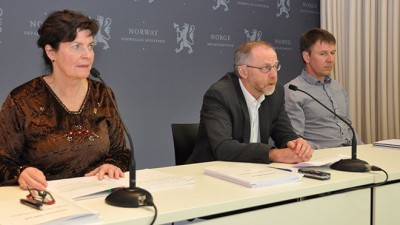Norway’s long-powerful farm lobby got another smack from the conservative government on Wednesday, and the mudslinging has begun. Farmers’ representatives accused the government of “actively reducing the ability to produce food in Norway,” while the government claimed its new offer of state support would still effectively give farmers much bigger pay raises than the vast majority of other Norwegians.

The farmers had sought additional state support, through a combination of direct and indirect subsidy, that was valued at NOK 860 million (USD 110 million). The government responded on Wednesday with an offer equivalent to NOK 90 million, albeit on top of the nearly NOK 15 billion that Norwegian agriculture already receives every year.
Leif Forsell, speaking on behalf of the state agriculture ministry that’s under the conservative political control of the Progress Party, noted that Norway’s economic situation “is more difficult this year that it was last year.” The state’s offer of additional support for farmers, vastly lower than what they wanted, was said to reflect Norway’s overall economic downturn since oil prices took a dive, along with state budget challenges, rising unemployment, the refugee influx and the need for lower income growth.
Forsell claimed the state’s offer would still give the farmers income growth of around 5 percent next year, at a time when many Norwegians are receiving no raises at all. He also noted that Norwegian agriculture has had “good development and extremely good income growth the past two years.”
It’s the farmers’ income growth that sparked unusually widespread criticism of the farmers’ demands this year, even from many who long have supported agriculture in Norway and the political tradition of maintaining farms (and thus population) in outlying areas of the country. State statistics show that the farmers’ average income rose by nearly 14 percent from 2014 to 2015, more than triple that of other wage-earning groups, thanks largely to lower energy costs, lower interest rates, strong markets and more efficient production, some of which also has been forced upon the farmers by the conservative government. It has promoted the creation of larger farms and greater economy of scale, despite farmers’ criticism that it also promotes centralization in a country long keen on decentralization.
Downplaying their income growth
The farmers’ two main lobbying organizations, Norges Bondelag and Norsk Bonde- og Småbrukarlag, have appeared keen to downplay their substantial income growth last year, seeking yet another 6 percent increase through their demands this year. That sparked a sharp retort from an economist at conservative think tank Civita that was published in newspaper Dagsavisen, better known for being among the farmers’ supporters.
“It’s not the first time that the farmers are trying to secure themselves large income growth, at the cost of the rest of society,” wrote economist Haakon Riekeles. “The income for the farmers comes right from the pockets of all those who today are showing moderation in pay demands.” He added that “No one can expect a 6 percent raise this year.”
Riekeles also noted that the average farm owner had annual income of more than NOK 600,000 in 2014, around NOK 100,000 more than the average pay for a full-time wage earner in Norway, according to state statistics bureau SSB. That’s because most farmers also have other sources of income than just farming, and in practice are part-time farmers.
“While the government is trying to improve conditions for full-time farmers, the farmers themselves are demanding more strength for the small farmers,” Riekeles wrote. The farming lobby, and the small Center Party that backs them, continues to fight the state’s efforts towards higher agricultural production that can be much more efficient.
‘Not meeting our priorities’
“We register that the state’s offer does not meet our priorities for better diversity within Norwegian agriculture,” Lars Petter Bartnes, leader of Norges Bondelag, said after receiving the state’s response to his organization’s demands. His colleague Merete Furuberg, leader of the small farmers’ lobby, claimed that the government was not following the Parliament’s goal of spreading food production all over the country.
Riekeles questioned the entire process of Norway’s annual state negotiations with the farmers. “Even though the farmers are small business owners, they have managed to get the right to collective bargaining as if they were wage-earners,” he wrote. That, he said, should obligate them “to show the same responsibility and solidarity that other wage-earners have shown” regarding pay growth moderation. “When they haven’t done that, it just shows that it’s time to wind down the system of agricultural negotiations,” he added. State funding for agriculture can simply be negotiated by the government itself as it puts together the rest of the state budget.
New Agriculture Minister Jon Georg Dale of the Progress Party let Forsell handle Wednesday’s annual formalities, but he’s made it clear he’s keen to boost food production through more consolidation and economy of scale. Dale grew up on a farm himself and hopes for a “good dialogue” in looming negotiations, “but I don’t think I’ll be loved.” His ministry is keen to reorganize farming as well, consolidating grain production, for example, in “typical” grain areas, with livestock in the districts. Milk production can also be streamlined dramatically, with efforts to recruit more dairy farmers.
The farming organizations will now evaluate whether there’s a foundation for negotiations. The deadline for an agreement is set for May 13, with the Parliament to debate state support for the farmers in June.
newsinenglish.no/Nina Berglund

